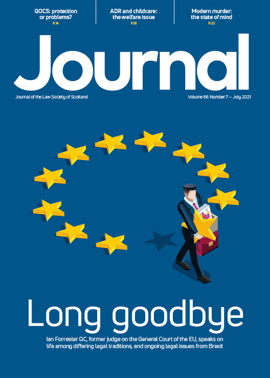Diversity – a work in progress
Diversity data collected as part of the 2020-21 practising certificate (PC) renewal process have been published by the Law Society of Scotland, offering an insight into today’s Scottish legal profession.
Diversity questions were included for the first time in the renewal process, in order to give a better understanding of what the profession looks like and help support and advance the Society’s equality and diversity work.
Around 80% of members provided the data, providing the most comprehensive picture of the diversity of the profession to date, how it compares to the diversity of the wider Scottish population and the challenges that the profession faces.
Solicitors were asked for information on their ethnicity, disability, religion, sexual orientation, and social background, including the type of school they mainly attended and what their parents’ occupation was. The data were automatically pseudonymised to protect members’ identities.
Key findings include:
- The Scottish legal profession is becoming more ethnically diverse, although more slowly than the wider population – just over 88% of the profession is white, with at least 3.38% of the profession, but almost 7% of solicitors aged under 30, coming from a Black, Asian and Minority Ethnic (BAME) background. The 2011 census showed around 4% of the general population as non-white, a proportion that is likely to have increased since. At least 18.7% of all BAME solicitors are partners in private practice, compared with 26.2% of all solicitors.
- While the feminisation of the profession continues, with around two thirds of all newly admitted members being female each year, there appears to be an acute issue attracting BAME men into the profession, with just 28% of all BAME solicitors being male.
- At least 3.2% of the profession is LGBTQ+ (more than 10% of respondents chose “prefer not to say” to this question).
- At least 4.8% of the profession has a disability, such as blindness, deafness or a mobility impairment. It is not known whether solicitors have disclosed their disability at work or requested reasonable adjustments.
- More than 46% of Scottish solicitors (and 60% of those under 30) do not subscribe to a religion; 37.5% profess a Christian denomination; 1.3% Islam; 1.6% another religion; and 12.8% preferred not to say.
- Two thirds of the profession (and 72% of those under 30) mainly attended a state school – figures that do not reflect the wider population.
- A solicitor’s socio-economic background does not appear to affect their career progression once they are in the profession. For example, those whose parents did routine/manual work are just as likely to be partners. However, it appears to be harder for those from lower socio-economic backgrounds to enter the profession to begin with.
The phrase “at least” in the above points indicates that some respondents preferred not to say, and/or that other information provided indicated that a respondent might fall into one of the diversity categories.
Society President Ken Dalling commented: “We undertook this research to gain a better understanding of the Scottish legal profession and how well it reflects the society that it serves. The information obtained provides a vital and worthwhile insight into the composition of the profession and the challenges that we face. While it is heartening to see that the profession is becoming more diverse, there is still progress to be made.
“With the majority of members completing the diversity information, we have our strongest evidence base yet to help us set effective policies that address the issues identified. We will do all we can to help encourage and support equal opportunities across the profession, and this data gives us a key set of benchmarks to measure our progress towards a truly inclusive profession.”
The research follows on from the Society’s 2018 Profile of the Profession report, the survey for which was completed by around 30% of the membership. The new data will help expand the Society’s understanding of the profession and inform its work, such as that being undertaken by the Racial Inclusion Group.
The Society will collect the diversity data every two years, the next time being during the practising certificate renewals in autumn 2022.
Society ranked in workplace diversity index
The Society has been named one of the UK’s Top 100 Most Inclusive Workplaces for 2021 by the National Centre for Diversity.
It placed 93rd on the Top 100 index, which recognises companies across the private, public and charity sectors that are best at promoting equality, diversity and inclusion, and fairness in the workplace through policies that deliver transformational change.
The Society’s ranking follows its work towards gaining the Centre’s accreditation as Investors In Diversity.
Perspectives
Features
Briefings
- Civil court: Final judgment
- Licensing: The shadow of criminal convictions
- Tax: Towards global rules for global businesses
- Immigration: Deporting the reformed character
- Coronavirus Acts: What does the new bill keep in force?
- Property: PSG at 20: still going strong
- In-house: Dealing at the cutting edge






